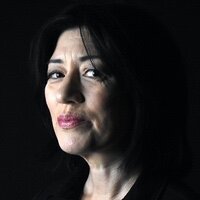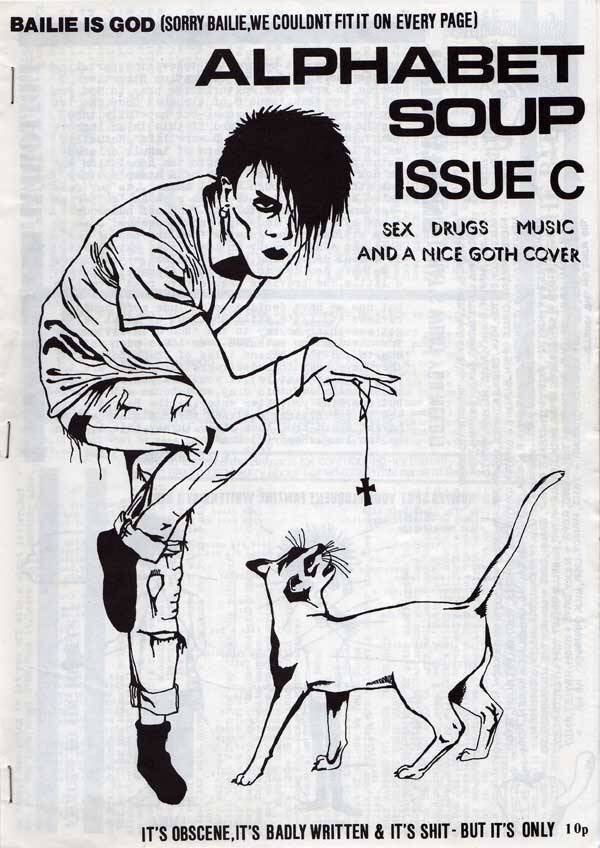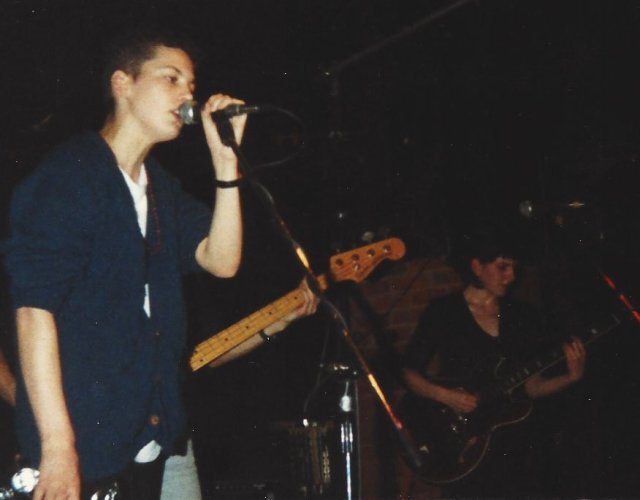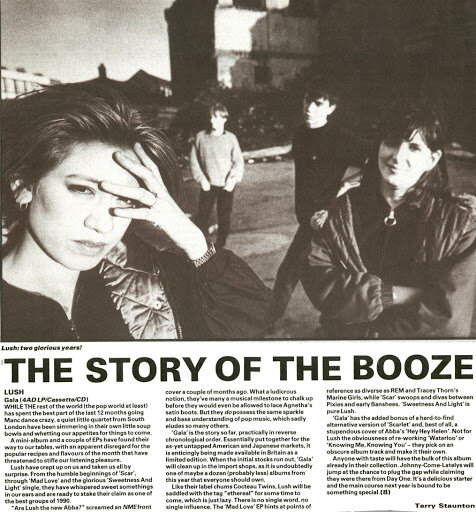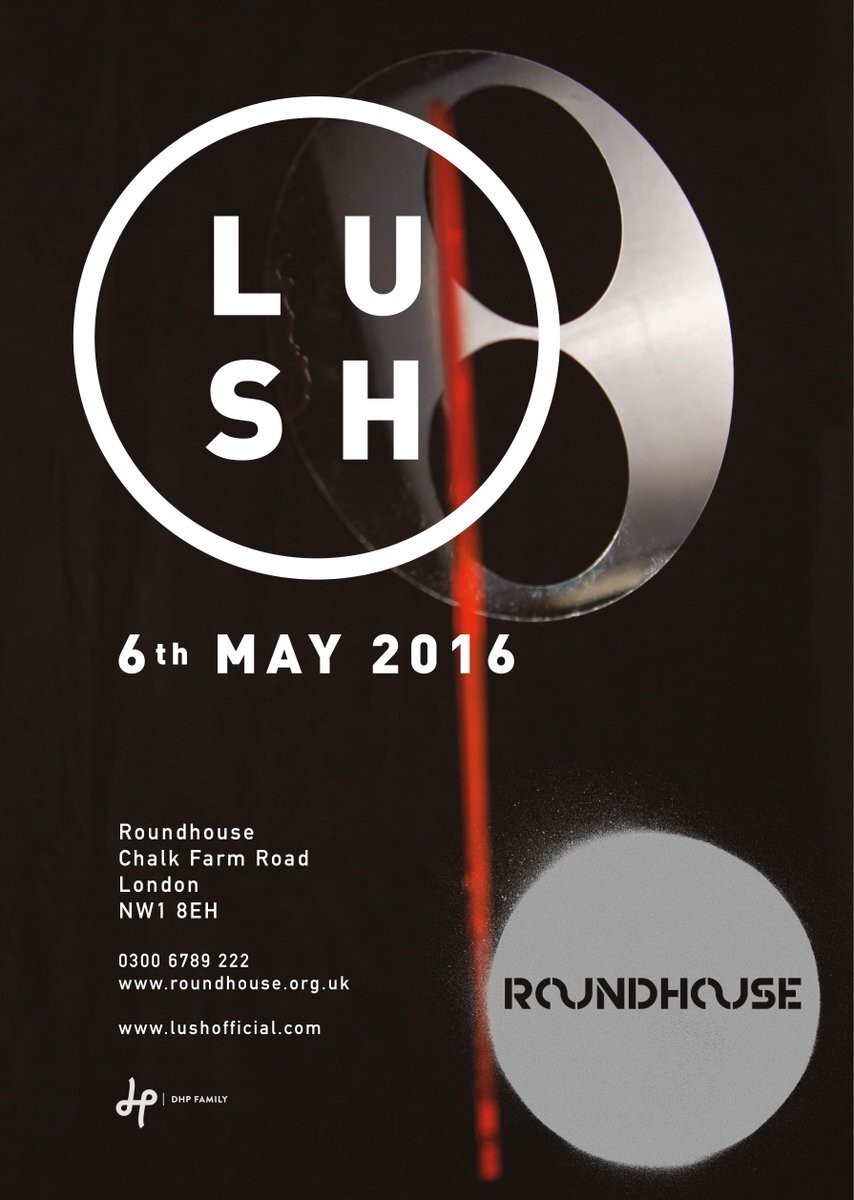LUSH
Lush were one of the first bands that I ever truly loved - thanks, The Chart Show - so it was essential that I inducted them into ‘Indie Heaven’ as soon as I possibly could. I came in on album three, 1994’s Split, and distinctly remember insisting that the clerk in Doncaster’s branch of Our Price take-off a Sting Best Of so I could hear it. A great band, Lush. In truth, they were three great bands, in three different eras.
Brilliantly, singer Miki Berenyi was both willing and able to chat. What follows is the conversation that ensued.
Hello Miki. Let’s start at the beginning. What are your memories of meeting Emma [Anderson, guitar and vocals] for the first time? You were 14, right?
“Emma arrived in my class on the same day as a vivacious, self-confident Californian girl who became immensely popular within 10 seconds. America was seen as super glamorous at the time. This left me free and unchallenged to bond with Emma over our both wearing the exact same Dolcis black and gold-weave ballet pumps.”
You end up doing a fanzine together, Alphabet Soup…
“Our first ever interview was with a band called Geschlecht Akt. We came to their soundcheck armed with a tape recorder the size of a bread bin, but were too self-conscious to take it out of the plastic bag we’d carried it in, so only realised afterwards that the Pause button was on throughout the interview. I therefore had to piece the entire conversation together from memory, which a few ciders down didn’t work out too well. There was an anecdote about a sax player whose name I couldn’t recall, so I just put “let’s call him John”, and then failed to refer to him again in the interview, thus rendering the reference pointless.”
Do you know the band Cay? I really want to do them for ‘Indie Heaven’, though sadly their singer Anet Mook passed away a few years ago. They were one of my first interviews. I forgot to press the record button.
“To be honest, we were hopeless at interviews and only did them because we thought that’s what you’re meant to do if you write a fanzine. The fanzine bits we enjoyed the most was making up a top 20 chart with all the names changed to rude words. Durex Durex – Shave a Hair; Pimpled Behinds – Glistening Thighs; Crapan – Tin Bum… you get the gist, which we thought was beyond hilarious. I mean, it really was quite terrible.”
So the group forms in 1987, as the Baby Machines. Meriel Barham is the singer. She leaves a year later and joins the Pale Saints. The end of the band, or a new beginning?
“It was nearly the end since we couldn’t find anyone to replace her. After yet another unsuccessful singer audition, I very reluctantly agreed to take on the job, and then things developed quite quickly so it was too late to step down.”
Now called Lush, it’s not long before the band signs to 4AD. Ivo [Watts-Russell, label co-founder] sends you to the acclaimed singing teacher Tona de Brett. Were you insulted? Or do you think it was needed?
“God no, I was delighted to be hooked up with her. She put me at ease and made me laugh – trilling away on the piano and operatically accompanying me singing ‘Leaves Me Cold’: “Dreams deep sleep teasing my mind… Night’s bright lights dim in the day”. She thought that was great for vowel-sound vocal exercises!”
We’re rattling through, but there’s plenty I’d like us to cover. Off the top of your head, what’s your principal memory of Lollapalooza in 1992?
“Off the top of my head, it was an insane amount of fun, if somewhat terrifying. Oh, the Ice Cube incident… We had a dressing room with an adjoining door one gig and their entourage hadn’t arrived yet so I wrote in lipstick on their mirror something like “Hey Cube, come and say hi and have a drink with us next door”. It was a simple invitation to a friendly beer but I was told that when they turned up there was a lot of muttering about ‘disrespect’, so I guess it didn’t go down well.”
Around about that time, riot grrrl happens, did you feel any affinity with that scene?
“I didn’t really get a chance because the main champions and cheerleaders of the UK scene instantly marked us out as the enemy. They slagged us off in the press and I had a very odd encounter with a couple of Huggy Bear at a Thee Headcoats gig where they told me ‘my sort’ didn’t belong there. Wrong kind of grrrl, I guess!”
Your manager, Howard Gough. The best man for the job, or just a man in the job? Also, I heard he really didn't like the band before he worked with you?
“Howard was the plugger at 4AD and he tried to dissuade Ivo from signing us because we were ‘the worst band he’d ever seen’. But once we were on the label, he got on especially well with Chris - I mean, who didn’t?. The can-do bombastic side of him was a tonic at first – he shook us out of our shells and bullied us out of self-doubt. But he could be oafish and rude, and he had no capacity for taking responsibility. When our star slipped with [3rd album, 1994’s] Split, his attention shifted to Menswe@r. By then he’d left 4AD to set up his own label and management company, and we were no longer of interest to him. In the end, he became a liability and I was glad to see the back of him.”
Do you ever hear from Steve Rippon, the band’s original bassist? What's he doing now? And did you ever read his book Cold Turkey Sandwich?
“Steve is alive and well and living in Ireland, doing one of those IT jobs that I can’t accurately describe. I see him every five years or so, when he makes it over to London, and it’s always great fun and reassuringly familiar to reconnect - he never changes at all!. Thanks for reminding me of his book, I just found it in an email attachment and I really should read it one day.”
Going back to Split. You worked with Mike Hedges. What was that like?
“Most of the problems were external and circumstantial. The actual recording of the music was great – we were excited and happy with the songs we had written, and worked well with Mike in developing them. Rockfield was fun for a while but, to be honest, we’d been talked by Howard into a residential set-up and it didn’t suit us. I got bored and homesick, missing the distractions and friends in London, and then Mike insisted we go to rural France to mix in his own studio. The isolation just became depressing. All this coincided with the three main supports for the band – Howard, the manager, Ivo, the label head and Tim Carr, our A&R at Warners – going through their own personal issues, which left us feeling abandoned. By the time we were remixing with Alan Moulder, morale was low – although he was wonderful! When the album finally came out, I struggled to find the energy and self-belief to withstand the mostly negative reviews.”
See, that blows my mind. Split features some of the most skeletal, revealing and honest songs you ever wrote. Why do you think it was so misunderstood?
“I think Split was the opposite of what the music press expected – they wanted a trajectory from ‘Sweetness and Light’, ‘For Love’ and ‘De-Luxe’ toward ever more polished, shimmery pop songs. And we gave them ‘Hypocrite’, ‘Desire Lines’ and ‘When I Die’! A fragile, downbeat, introverted album was about as out of step as you could get in 1994, when the vibe was all about being big and brash and having it large.”
You approached Bob Mould to produce Split. That never happened. Why?
“This feels like it should be a landmark memory, but I honestly have barely any recollection. At the time, there were so many names being bandied about and suggestions were flying in from all sides. Steve Albini came up, as did Bob Rock – definitely one of Howard’s! - and a lot of that stuff ends up depending on practicalities, like people’s schedules and how much they want paying. So yes, I remember Bob Mould being mentioned as an idea and then it suddenly wasn’t, but I genuinely can’t remember why.”
What are your memories of your A&R, Tim Carr?
“I loved Tim - he was into the bands he represented heart and soul, was great company - very funny and brilliant at taking the piss – especially out of himself!, and had vast enthusiasm and knowledge of music, plus a heap of entertaining anecdotes. I was particularly impressed that he had once dated the actress Teri Garr – so cool! But he struggled with his own particular darkness and died several years ago. I really miss him.”
Lush were in America all the time. Did you like it?
“I mostly loved playing America – it’s well suited to the transience of touring. Even a cheap roadside motel has a kind of faded glamour, and driving through the Utah salt flats or up the Pacific coast would prompt frequent cries of “scenic wonder!” as a cue for everyone to rush to the windows and take in the scenery. Also, our US audiences always seemed to be up for a good time – welcoming and enthusiastic – which is great energy when you’re performing. But it’s also vast, it takes weeks and weeks to cover all that ground, and as someone who needs home and close friends to keep me grounded and happy, that amount of touring wasn’t great for my mental health. I’d get pretty out of control, seeking distractions.”
That ‘breaking America’ thing was talked about all the time in the 90’s, but was that important to you?
“I just found you could never ever do enough to satisfy the itch that you are so, so close to ‘breaking’ America, so the US record company and every manager I’ve ever worked with becomes obsessed with this goal. Every spare minute of the day was packed with radio station interviews, sessions, post-soundcheck meet and greets, pre-gig dinners with local reps and post-gig late-night record store signing sessions. And every event demanded high-octane “this is so much fun, you guys!” always-on enthusiasm. It was often very enjoyable - but it took its toll.”
What was your experience of the 90's music press? From the outside looking in, it seemed that they could not get over the fact you all really liked to go to the pub.
“I suppose it seemed like an interesting angle – 4AD arty label artists contrasted with potty-mouth, cider-swilling Spurs supporter. But once that’d been established, it became a caricature. Bands are as trapped in the PR/interview/review cycle as journalists, so it felt like an ambush to open up and talk, then have everything you say twisted and made to look like you’re a bunch of inarticulate thickos or up-their-own-arse divas. Part of our problem was that we knew a lot of the journalists socially - and we still do! We’d become mates with people like James Brown, John Robb and Everett True from years earlier in the fanzine scene, and Emma had worked with Jeff Barratt doing PR for Creation and Factory. At the time of Split, I was in a relationship with the PR John Best and Emma was with Ted Kessler, then, Features Editor at NME. Phil [King, bass] actually worked at the NME as a picture researcher, so he knew loads of them really well!”
Did you ever get accused of nepotism?
“It put us in a tricky position because if a writer we knew gave us a good review or a positive interview, it was perceived to be because they were doing us a chummy favour, not because our music had any merit. So I heard that there were occasions when editors would specifically assign us writers who had already made up their minds that we were shit, to provide ‘balance’…”
It's hard to deny that Lovelife in 1996 is a different beast to all that came before. I don't think people create art by sitting around and thinking, 'hmmm, that Britpop thing is happening, let's have a go at that!' But do you think you were conscious of what was happening around you and that fed into the songwriting?
“My memory is that Split had been slagged off, it sold half of what [1992’s 2nd album] Spooky had, we were struggling to find a manager and we were written off as has-beens, so if we were going to survive we had to plot a different course. Yes, I do think we opted for a more uptempo vibe that was a better fit with the zeitgeist at the time, but the more in-your-face lyrics were less to do with trying to be Britpop and more about recognising that Split was not well received. Writing about childhood experiences of neglect and abuse, your parent’s death, heartbreak and infidelity, and having it scornfully dismissed as a load of nonsense, makes you somewhat reluctant to expose your vulnerabilities again. So this time around it was less confessional.”
That’s, not necessarily me, but someone told!
“And it’s not like we decided to hunt down a known Britpop producer to work with – we just made a record with our long-time live soundman Pete Bartlett, so we could make an album that more closely reflected how we actually sounded when we played live. So no, we didn’t sit around cribbing notes from Oasis records and trying to come up with a formula for success, but we recognised that if we delivered another Split, we shouldn’t be surprised if no one wanted to listen.”
Anthony Kedis, Matt Sharp... I think those are two of the blokes in 'Ladykillers'. Who am I missing? G'wan, tell us...
“No, because social media spread makes these things spin out of proportion and the lyric is just meant to be an observation, not a crucifiction.”
Do you remember how you felt when Emma called saying she wanted to leave?
“I hadn’t seen Emma for a few weeks after the last US tour and then she repeatedly blanked me at a Suede gig at the Kilburn National every time I went up to say ‘hello’. So I kind of figured something was up. We had a band meeting a while later, and she said she was done with it all. A lot of it centred on the relentless US touring and our management at the time – all fixable, as far as I was concerned. I recall saying that we were lucky to have Lush, and wouldn’t be so lucky again – so if she wanted to record an album of Gregorian chants I’d be up for giving it a go, whatever it took to keep Lush going. I think she was genuinely surprised that I felt that way, but it ended up being a moot point after Chris [Acland, drums] died.”
That happens on October 17th, 1996. Just how important was Chris to what Lush was?
“Hugely important. Central. If you never met him, it’s difficult to convey his effect, but it was exceptional. He was like a charm for the band – we wouldn’t have survived as long as we did without him – and I personally would not have coped with being in Lush if I hadn’t had him by my side. Plus, of course, he was a great drummer with a unique style.”
You went almost completely dark after Chris died and barely made any music for years. Was that grief, do you think?
“The grief was overwhelming. I’d never had anyone close die, so I was completely unprepared. And I loved him so much, never imagined a future without him, so I was totally unable to rationalise it. I just couldn’t accept that that was it – he’s gone and he’ll never be here again. I’d dream about him and cry when I woke up, because I’d had a chance to be in his company and how do you make yourself dream about that person again so you can relive some time with them? Various people very kindly suggested new music ventures – I remember Tim Carr trying to set me up with Kat Bjelland for a collaboration – but everything about music reminded me of Chris’s absence. I went to a few gigs thinking it would do me good but it would just take a couple of drinks and I’d be sobbing. So I realised I just needed to get away from all the triggers. I needed to start a different path.”
Emma went off and did Sing-Sing in the interim. I liked them. I believe Lush first toyed with reforming in 2007 when they disbanded. Why didn't that happen?
“At the time, my children were still very young and I was neck-deep in motherhood, plus I wasn’t into social media and took some convincing that there was an audience for a Lush reunion. Also, without Chris it just didn’t feel like something I’d enjoy. However, Emma and Phil’s keenness was infectious and I hate to pass on an opportunity. The ball started rolling with an offer to do Spooky live for All Tomorrow’s Parties, so I agreed. And then I got told the organiser had changed their mind because they listened to the album and on second thoughts they didn’t really like it, so ‘No’…”
Whaaaaaaaaat?
“I’ve since heard noises that this wasn’t quite true, and it was down to an agent we were working with that they didn’t like, but in either case it just reminded me of the worst aspects of the music industry, so I felt justified to walk away. I think at the time I referred to it as ‘flaky cuntishness’.”
When you do make the decision to reform, in 2015, how exactly did that happen? Who made the first call?
“Emma had met a manager who was disarmingly enthusiastic - if naively and, I would say, wilfully unrealistic - and it rolled on from there. I’m going to tread carefully here because it ended up being a fucking nightmare, but I’ll hand it to the guy that the reunion was sparked by him. For that, at least, I thank him.”
When the first Roundhouse show sold out in six hours, were you surprised?
“I was blown away! There were people travelling from far-flung nations to attend – I just couldn’t believe it! TWO NIGHTS AT THE FUCKING ROUNDHOUSE. I mean, WTF?! It was a great experience and I will go to my grave treasuring the memory."
The reunion was brief though.
“The negatives overwhelmed the positives in the end, and all the old baggage resurfaced. But it was personal, rather than musical. I feel like it’s possibly something that a good therapist could have fixed, but that would have entailed a level of emotional commitment I don’t think any of us were capable of.
As far as I'm aware, Lush's creative outlet was made up of you and your songs and Emma and her songs. Did you ever collaborate? Did you ever get close to? Did you ever want to?
“At first we did, and I sometimes wrote the lyrics for her songs. But Emma and I became polarised in so many ways that eventually I felt any input I offered on her songs was unwelcome. And my songs were of little interest to her, so she had no enthusiasm for investing any time or energy in embellishing them. This may be harsh – sadly, we never thrashed this out so it just became the accepted norm, and we reframed it as a positive. Virtue from necessity. But it’s why the producers we worked with were so key, because they were the only point of collaboration.”
I’ve always wanted to be more collaborative in my creative ventures, but I think I might just be a fucking nightmare.
“Piroshka’s music is much more collaborative, and that’s not to say it’s always a smooth ride but I do prefer it. This is going to sound really sappy but when Mick [Conroy] came up with a bass part for one of my tunes on the new album, it was so moving and lovely it brought tears to my eyes!”
There's a brilliant line in a piece Dorian Lynskey did for The Guardian in 2015 where he says that Lush were a band who always looked like they were having fun, even when they weren't. Is that true do you think? How much of being in Lush did you not enjoy?
“Well, if you get invited to a party, you have to make the effort. It would be rude not to, and if you go with the flow, there’s always the chance that you might genuinely enjoy it. And I really did enjoy most of it. I felt incredibly lucky to be in Lush and on 4AD, being afforded so many opportunities and experiences. But I am not a confident musician or singer, and feel equally insecure about my songwriting abilities, so I didn’t have the resilience to cope with the criticisms. On one level, I felt unfairly picked on; but on another, I thought they probably had a point!”
Brains. Brains are bonkers.
"I think one of the hardest parts was balancing the public and the personal. I recall doing an interview with The Stud Brothers for the Melody Maker where Emma and I were complaining about the press not getting “who we really are” and Dom [Wills] pointing out that he couldn’t think of anything more terrifying than having “who you really are” out in the public domain. It was a good point, and it made me accept the ‘Miki from Lush’ public persona more. I decided that it’s better to be misunderstood if it’s an image you’re actively participating in constructing as armour to protect your ‘real’ self. But the flipside is that you’re then trapped into being someone other people expect you to be, which is hard to maintain when you eventually aren’t even sure if you even like that person!”
I swear I’ve had this exact same conversation with my therapist.
“Ultimately, though, the hardest part was the conflict with Emma. It made me miserable and anxious being around someone who actively disliked me. I’m sure it was no picnic for her, either – I can be really fucking annoying to be around, demanding and needy, and I take up a lot of space – but tiptoeing around her moods and incessantly being on the receiving end of her hostility really fucked with my head.”
Well, I’m just a fan. And I loved the music you both made. So thank you. Tell me more about your new band, Piroshka!
“We have a new album out in 2021. It’s quite a deliberate change from the first album, Brickbat, which was more about capturing the immediacy of a nascent band, running with ideas and riding on enthusiasm. The new album is more thoughtful and developed and explorative. All of which sounds like waffle, but here’s a shortcut. Ivo found Brickbat unlistenable, but this one he says ‘you sound like a completely different band…’”

